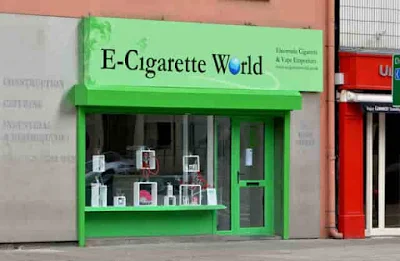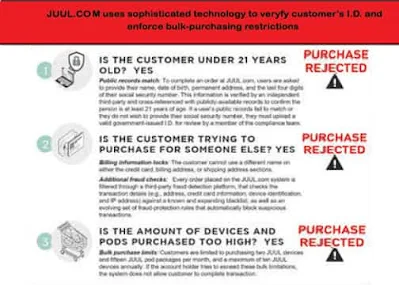WASHINGTON — Facing mounting government pressure and a
public backlash over a plague of teenage vaping, Juul Labs announced on Tuesday
that it might suspend sales of most of its flavored e-cigarette pods in retail
stores and would discontinue its social media promotions.
Juul’s announcement effectively undercuts the Food and DrugAdministration’s decision to unveil a series of measures aimed toward curbing
teenage vaping.
The agency is predicted later in the week to announce a ban
on sales of flavored e-cigarettes in convenience stores and gas stations and
strengthen the want for age verification of online sales of e-cigarettes.
To prevent some users from reverting to menthol cigarettes,
Juul said it might keep mint, tobacco, and menthol flavors for its devices in
retail stores.
In recent months, the F.D.A. has mounted an increasingly aggressive campaign against the main manufacturers of vaping products that
appeal to children, focusing, particularly on Juul.
The company’s sleek device (nicknamed the iPhone of
e-cigarettes) resembles a flash drive and comes with flavor pods like crème and
mango, leading public health officials to criticize corporate et al.
For appearing to plug on to teenagers, who are especially
susceptible to drug addiction.
E-cigarettes were originally developed to assist smokers in
quitting by giving them away to satisfy their nicotine cravings without the tar and
deadly carcinogens that accompany burning tobacco.
“Our intent was never to possess youth use, Juul,” said
Kevin Burns, chief executive of Juul Labs during a statement emailed to
reporters.
“But the intent isn't enough. The numbers are what matter
and therefore the numbers tell us underage use of e-cigarettes may be a
problem.”
But critics and public health advocates said the corporate
had no choice, especially after the F.D.A. seized documents associated with
marketing strategies from the company’s headquarters last month, and while some
states were investigating whether its tactics were directly aimed toward
minors.
Caroline Renzulli, a spokeswoman for the Campaign for
Tobacco-Free Kids called Juul’s announcement insufficient too late. “Juul’s
social media marketing fueled its popularity with kids,” she said.
“Now that it's captured 75 percent of the e-cigarette
market, Juul not must do social media marketing because its young customers do
it for them.”
Maura Healey, the attorney general for Massachusetts, echoed
that sentiment. “Unfortunately, much of the damage has already been done,”
she said.
“Our investigation into Juul’s practices, including if it
had been knowingly selling and marketing its products to children, will
continue.”
In a tweet, Tuesday afternoon, Dr. Scott Gottlieb,
commissioner of the F.D.A. said: “Voluntary action is not any substitute for
regulatory steps #FDA will soon take.
But we would like to acknowledge actions by Juul today and
urge all manufacturers to right away implement steps to start out reversing
these trends.”
The F.D.A. acknowledged earlier this year that it had been
caught off-guard by the soaring popularity of vaping among minors, and also
began targeting shops that were selling them the products.
In September, it gave Juul and makers of a couple of other
flavored e-cigarettes and vaping products 60 days to submit plans to prove they
might keep them far away from minors. That deadline passed this past weekend.
More than three million middle and high school students
reported using e-cigarettes, consistent with preliminary, unpublished
government data, with about one-third of them saying the flavors were an
enormous think about their choice.
Mr. Burns, the Juul executive, said that as of Tuesday, the
corporate would stop accepting retail orders for mango, fruit, crème, and
cucumber Juul pods. Those account for about 45 percent of retail sales for the
$16 billion company, consistent with some estimates.
Lower within the announcement, the corporate said it might
renew sales of these products at shops that invested in age-verification
technology A timetable for
resuming those sales weren't announced.
At the top of the year, Mr. Burns said, Juul, will add a real-time photo of the requirement to match a buyer’s face against an uploaded government-issued ID.
The company also will attempt to prevent bulk shipments to people that are
distributing to minors, by restricting customers to 2 devices and 15 pod
packages per month, and not quite 10 devices per annum.
In
addition, Juul said it might pack up its Facebook and Instagram accounts within
us that promoted the utilization of the flavored pods.
According
to its release, the corporate said it might ask the main social media
companies, including Twitter and Snapchat, to assist them in “police” posts that
promote the utilization of e-cigarettes or cigarettes by underage users.
Dr.
Gottlieb said earlier that officials had met with several e-cigarette and
tobacco companies to debate ways to scale back youth vaping after threatening
to require e-cigarettes off the market if the businesses couldn't curb teenage
sales.
Some
companies have indicated they might heed the F.D.A.’s warnings. In October,
Altria said it might discontinue most of its flavored e-cigarettes and stop
selling some brands entirely.
For
the primary time, the tobacco giant also said it might support a law raising
the age to 21 for the acquisition of all tobacco and vaping products, a proposal it had previously resisted.
R.J.
Reynolds Tobacco Company, a subsidiary of British American Tobacco, also
submitted plans to the F.D.A. on Friday that backed the upper regulation.
Michael
Shannon, a spokesman for R.J. Reynolds, said it also agreed to not market
products through social media influencers and would also require age verification for access to the website where it sells the e-cigarette
Video.
The
tobacco company stopped in need of promising to require Vuse, which comes in
berry and other flavors, out of retail stores, but Mr. Shannon said the
corporate would enforce contractual penalties for retailers that sell tobacco
products to youths.
In addition, it plans to start out a mystery shopping program to see compliance.
On
Tuesday, CNBC reported that Fontem Ventures, a unit of Imperial Tobacco Group,
would raise the minimum age to shop for pods on its website to 21.
The company sells blu e-cigarettes, which are available in various fruity flavors.
Since
it came on the market in 2015, Juul has become about irresistible to teenagers,
who had been drilled since preschool days on the perils of cigarette smoking. The
name itself seemed like a mash-up of “jewel” and “cool.”
Unlike
the clunky older vapes, the compact device could readily evade detection from
parents and teachers.
It
not only seemed like a flash drive but it could even be recharged during a
computer’s USB port.
The
flavors were both alluring and complicated. And it offered how for teenagers to
rebel and appear hip, seemingly without causing cancer.
And
so Juul became a quick, furious hit among high school and even secondary school
students.
A comprehensive report on e-cigarettes in January by the National Academies of
Sciences, Engineering, and Medicine noted that 11 percent of all high school
students, or nearly 1.7 million, had vaped within the last month.
Preliminary
unpublished federal data estimates that number is now a minimum of three
million.
By
now, students have their own vocabulary built around Juul — “juuling” has
become a verb. Schools
around the country were caught unaware.
The
aerosol mist from Juul is almost odorless and dissipates within seconds. Students
began juuling as teachers’ backs were turned.
They
filled school bathrooms for juuling breaks. And for all that faculty officials
knew, students were just diligently recharging flash drives on laptops.
Within
18 months of Juul’s release, school officials began confiscating them and
providing information sessions to oldsters.
They
had two paramount concerns: the increasing use of Juul and other vapes for
marijuana and therefore the amount of nicotine in Juul’s pods.
Nicotine,
the present chemical in tobacco is the addictive element that binds
smokers to cigarettes and vapers to Juul and other e-cigarettes.
Teenagers,
whose brains are still developing, need less exposure to nicotine than adults so
as to become addicted.
But
perhaps most worrisome was a conclusion reached by the National Academies: that
teenagers who use the devices could also be at higher risk for cigarette
smoking.
In
its announcement on Tuesday, Juul emphasized its product’s use among adults as
an alternative to cigarette smoking and said it might still post testimonials
on YouTube of adults who had switched to Juul from traditional cigarettes.
Later
in the week, the F.D.A. is predicted to propose a ban on sales of flavored
e-cigarettes, with a couple of exceptions; pursuit of a ban on menthol
cigarettes, which could take years to travel into effect; and stricter controls
of online sales to banning minors from accessing the products.


FreeMax is the famous e-cig brand on the market. And for your vaping you still need smok mag mod kit because it can change your vaping life. I think every vapers should like uwell nunchaku kit as it very important.
ReplyDeleteThank you for sharing Nice Blog
ReplyDeleteIF you are seeking best E-cig Store in Egg harbor you must visit at Vape And Tobacco Store in Horbar, New Jersey. for more information Just click On this link
Recollect that the smoking of cigarettes began slowly. Nobody began smoking a bunch of cigarettes daily in that dreadful early phase of smoking cigarettes. 420 mail order
ReplyDeleteI get it was cool and marvelous when they breathed in/breathed out smoke in their lungs. It made them look more astute and in charge. I didn't have the foggiest idea how to smoke by any stretch of the imagination. I just puffed and hacked from the consuming impression that I felt in my chest and lungs. It was outrageously difficult! One day a companion took an open pack from his mom and we attempted to smoke a genuine cigarette. buy weed online cheap
ReplyDelete